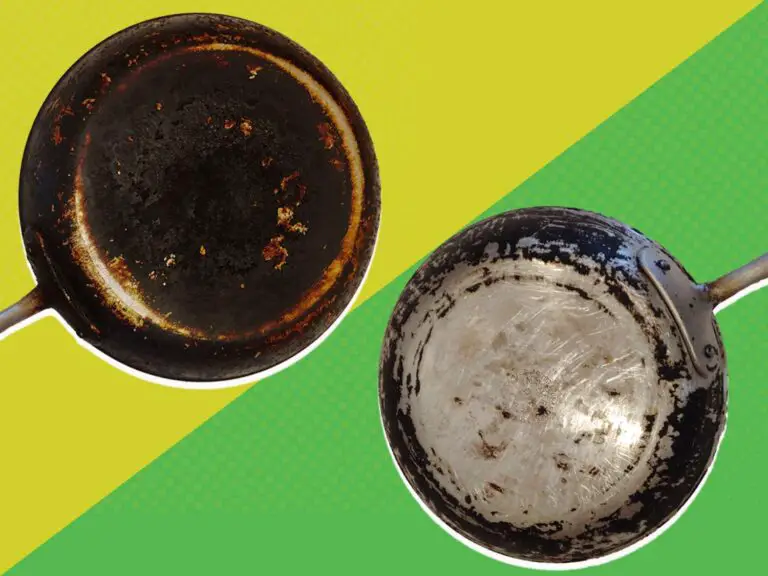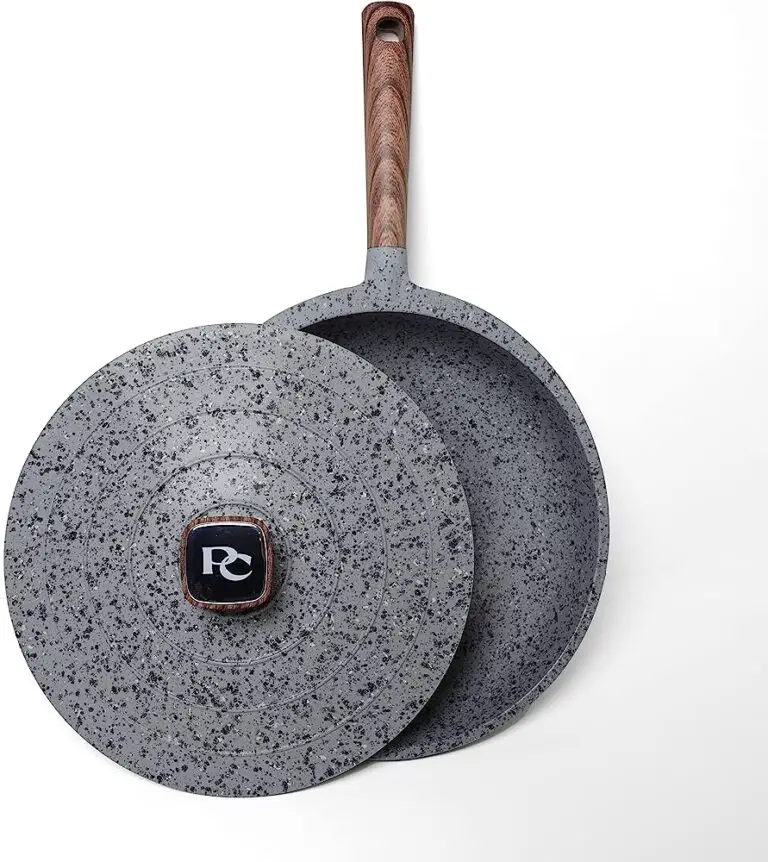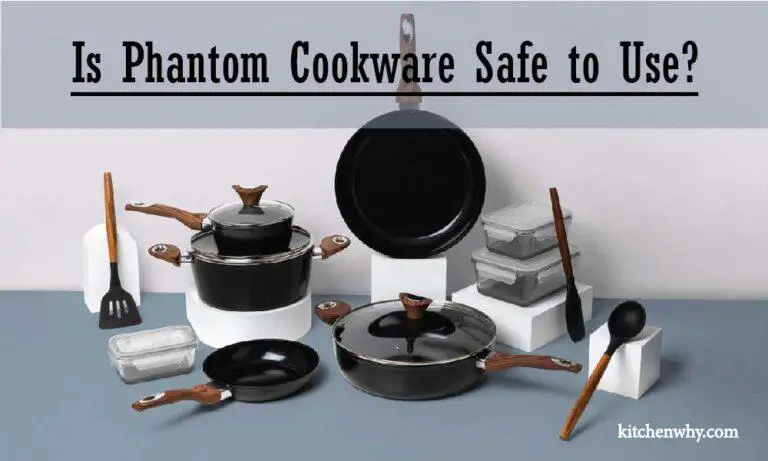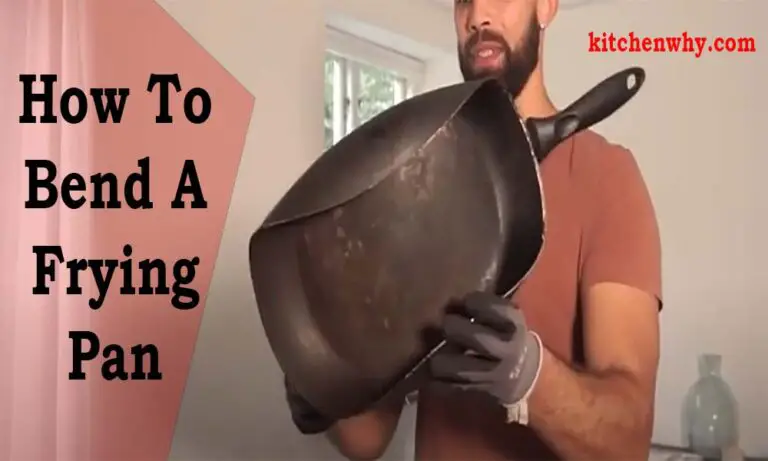Can you use oven cleaner on frying pan? expert Tips

Cooking enthusiasts often encounter stubborn stains and burnt residues on their frying pans after preparing delicious meals. To maintain the pan’s cleanliness and functionality, the question arises: Can you use oven cleaner on frying pans?
This article explores the compatibility of oven cleaners with different types of frying pans and provides alternative cleaning methods to maintain their longevity.
Can you use oven cleaner on frying pan?
While oven cleaner is designed to remove stubborn grease and grime from the surfaces of ovens, it is not typically recommended for use on frying pans. Oven cleaner contains strong chemicals that can be harsh and abrasive, which may damage the surface of a frying pan. It is best to check the manufacturer’s instructions or guidelines for cleaning your specific frying pan.
In most cases, using mild dish soap and warm water with a non-abrasive sponge or cloth should be sufficient for cleaning a frying pan. If you have tough stains or burnt-on food, you can try soaking the pan in warm soapy water or using a gentle scrub brush.
How to Use Oven Cleaner on Frying Pan?
Using oven cleaner on a frying pan can be effective for removing tough stains and burnt-on residue. Here’s a step-by-step guide on how to do it safely:
- Safety Precautions: Before you begin, make sure to read and follow the instructions on the oven cleaner’s label. Wear protective gloves and ensure the area is well-ventilated.
- Choose the Right Cleaner: Select an oven cleaner that is suitable for the material of your frying pan. Most oven cleaners work well on metal and stainless steel pans, but they may not be suitable for non-stick pans or those with delicate coatings.
- Prepare the Area: Take the frying pan outside or to a well-ventilated area, preferably outdoors. Lay down some newspapers or old towels to protect the surface you’ll be working on.
- Apply the Oven Cleaner: Spray or apply the oven cleaner generously all over the interior and exterior surfaces of the frying pan. Make sure to cover any stains, burnt areas, or tough residues.
- Allow Time to Work: Read the instructions on the oven cleaner to determine the recommended amount of time to let it sit on the frying pan. This usually ranges from a few minutes to an hour, depending on the product’s strength and the severity of the stains.
- Scrubbing: After the designated time has passed, use a non-abrasive scrubbing brush or a soft sponge to gently scrub the frying pan. The cleaner should have loosened the stains and residues, making it easier to remove them.
- Rinse Thoroughly: Once you have scrubbed away the stains, thoroughly rinse the frying pan with water to remove any remaining oven cleaner residue. Ensure you remove all traces of the cleaner before using the frying pan again.
- Repeat if Necessary: For particularly stubborn stains, you may need to repeat the process or leave the oven cleaner on for a longer period. Always follow the manufacturer’s instructions and avoid excessive scrubbing to prevent damage to the frying pan.
- Clean the Cleaning Tools: Don’t forget to clean the scrubbing brush or sponge you used to clean the frying pan. Rinse them well and let them dry before using them for other cleaning tasks.
- Dispose of Properly: Follow the instructions on the oven cleaner label for proper disposal. Some products may require specific disposal methods.
Remember, using oven cleaner on a frying pan should only be done when other cleaning methods have failed, and it’s essential to do so with caution, as the cleaner can be harsh and potentially damaging if not used properly.
Understanding Oven Cleaner
Oven cleaners are potent cleaning agents designed to dissolve tough, baked-on grease and grime in ovens. These cleaners typically contain strong alkali substances like sodium hydroxide, which work effectively on metal surfaces to break down and remove stubborn residues. The active ingredients in oven cleaners make them highly effective for oven cleaning purposes.

Composition of Oven Cleaners
Oven cleaners primarily consist of chemicals such as sodium hydroxide or potassium hydroxide. They may also contain surfactants and solvents that aid in the removal of grease and grime. While these chemicals are excellent for cleaning oven interiors, their impact on various cookware materials needs careful consideration.
Different Types of Frying Pans
Before using oven cleaner on a frying pan, it is essential to understand the type of pan you own, as the material of the pan plays a significant role in determining its compatibility with the cleaner.
- Non-stick Frying Pans: Oven cleaners should never be used on non-stick frying pans. The harsh chemicals can damage the non-stick coating, rendering the pan ineffective and potentially releasing harmful fumes during cooking.
- Cast Iron Frying Pans: Cast iron pans are seasoned and should be treated with care. Oven cleaners can strip away the seasoning, leading to rusting and a loss of the pan’s natural non-stick properties.
- Stainless Steel Frying Pans: Stainless steel pans are relatively more durable, but oven cleaners can still cause discoloration or damage to the pan’s surface. It’s best to avoid using oven cleaners on stainless steel pans.
Potential Risks of Using Oven Cleaner on Frying Pans

Using oven cleaners on frying pans not suitable for such treatment can have adverse effects. The harsh chemicals may react with the pan’s surface, leading to discoloration, loss of non-stick properties, or even compromising the pan’s integrity. Moreover, residue from the oven cleaner might remain on the pan even after rinsing, which can be harmful when ingested with food.
Alternative Ways to Clean Frying Pans
To avoid the risks associated with using oven cleaner on frying pans, consider these alternative and safer cleaning methods:
- Non-Toxic Cleaning Solutions: Opt for non-toxic cleaning solutions like baking soda and vinegar. Create a paste using baking soda and water, apply it to the stained areas, and let it sit for a few minutes before scrubbing with a soft brush. Vinegar can also help to remove tough stains and add shine to the pan.
- Natural Cleaning Methods: Lemon juice and salt can be effective in cleaning stains from frying pans. Sprinkle some salt on the pan’s surface, then rub it with half a lemon. The acidity of the lemon helps break down stains and leaves the pan smelling fresh.
Maintaining Frying Pans for Longevity
Regular maintenance is essential to extend the life of your frying pans. Here are some tips to keep them in top condition:
- Avoid using metal utensils that can scratch the pan’s surface.
- Use wooden or silicone utensils to prevent damage to non-stick coatings.
- Hand wash the pans with mild soap and warm water to preserve their integrity.
- For stubborn stains, soak the pan in warm, soapy water before cleaning.
- Store frying pans carefully to prevent scratches and dents.
Conclusion
In conclusion, using oven cleaner on frying pans can be risky, especially for non-stick, cast iron, and stainless steel pans. The harsh chemicals in oven cleaners can damage the pans’ surfaces and compromise their functionality. Instead, opt for non-toxic and natural cleaning methods to ensure the pans remain in good condition for a long time.
Credit: www.nytimes.com
Understanding The Difference Between Frying Pans And Oven Cleaners
Can You Use Oven Cleaner On Frying Pan?
Frying pans and oven cleaners are two essential kitchen tools that serve different purposes. While frying pans are used for cooking food on stovetops, oven cleaners are specifically designed to clean the interior surfaces of ovens. It’s important to understand the distinction between these two items to avoid any potential damage or misuse.
How Frying Pans Are Made And Their Intended Use
- Frying pans, often made of materials like stainless steel, cast iron, or non-stick coatings, are crafted to withstand high heat and distribute it evenly for cooking.
- The different types of frying pans available cater to various cooking techniques, whether it’s frying, sautéing, searing, or braising.
- The handles on frying pans are designed to stay cool and provide a comfortable grip for easy maneuvering.
What Oven Cleaners Are And How They Work
- Oven cleaners are specialized cleaning products that help remove grease, stains, and burnt-on food residue from the interior surfaces of ovens.
- These cleaners typically contain powerful ingredients such as alkalis and detergents, which break down tough stains and grime.
- Oven cleaners work by applying the product onto the oven surface, allowing it to penetrate and loosen the dirt, and then wiping it away.
Exploring The Compatibility Of Frying Pans And Oven Cleaners
- It’s crucial to note that oven cleaners are not intended for use on frying pans or any cookware.
- Frying pans are designed to withstand heat during cooking, but oven cleaners contain harsh chemicals that can damage or strip the non-stick coating or seasoning on the pan.
- To clean a frying pan, it’s recommended to use mild dish soap, warm water, and a gentle scrubbing brush or sponge.
- Avoid using abrasive cleaners or scouring pads, as they can scratch and damage the surface of the pan.
- Proper care and maintenance of frying pans will ensure their longevity and optimal performance.
Understanding the differences between frying pans and oven cleaners is essential to keep your cookware in good condition and maintain a safe cooking environment. Remember to use the appropriate cleaning methods for each tool, and always prioritize the care and preservation of your kitchen equipment.
Risks And Potential Hazards Of Using Oven Cleaner On Frying Pans
Using oven cleaner on frying pans may seem like a convenient solution for removing stubborn stains and grease buildup. However, it’s important to be aware of the risks and potential hazards associated with this practice. In this section, we will discuss the chemical reactions that can occur between the pan and the cleaner, the health risks involved, and the potential damage to the pan’s coating or seasoning.
Chemical Reactions That Can Occur Between The Pan And The Cleaner:
- Oven cleaners often contain strong and corrosive chemicals such as lye or sodium hydroxide.
- When these chemicals come into contact with certain types of pans, especially non-stick pans or those with enamel coatings, they can cause chemical reactions.
- These reactions may result in discoloration, peeling, or degradation of the pan’s surface.
- Additionally, oven cleaners can leave behind residues that may affect the taste and quality of the food cooked in the pan.
Health Risks Associated With Using Oven Cleaner On Cookware:
- The fumes emitted by oven cleaners can be harmful when inhaled and may cause respiratory irritation or even chemical burns.
- Direct contact with these cleaners can cause skin irritation, burns, or allergic reactions.
- If the cleaner is not rinsed off thoroughly, it may contaminate the food prepared in the pan, posing a risk to your health.
Potential Damage To The Coating Or Seasoning Of The Pan:
- Non-stick and coated pans are designed to have a protective layer that prevents food from sticking and makes cleaning easier.
- Using oven cleaner can strip away this protective coating, rendering the pan less effective and potentially exposing you to harmful chemicals.
- For seasoned pans, which develop a natural non-stick surface over time, oven cleaner can disrupt this seasoning, requiring you to re-season the pan.
It’s always best to follow the manufacturer’s instructions for cleaning your cookware. In most cases, regular dish soap, warm water, and gentle scrubbing should be sufficient for maintaining your frying pans. If you encounter stubborn stains or grease buildup, consider using alternative methods or specialized cookware cleaners designed specifically for your pan’s material.
By taking these precautions, you can ensure the longevity of your frying pans and protect your health while cooking.
Alternatives To Oven Cleaner For Cleaning Frying Pans
Cleaning your frying pans thoroughly after each use is essential to maintain their longevity and ensure your food tastes delicious every time. While oven cleaner may seem like a convenient option, it is not always suitable for cleaning frying pans.
Fortunately, there are alternative methods and products that are safe and effective. We will explore natural cleaning methods using household ingredients, safe commercial cleaning products specifically designed for cookware, and tips and tricks for effective and gentle cleaning.
Natural Cleaning Methods Using Household Ingredients:
- Baking soda: Sprinkle baking soda onto the frying pan and scrub gently with a sponge or cloth. Rinse thoroughly.
- Vinegar: Create a mixture of equal parts vinegar and water. Apply the solution to the pan, let it sit for a few minutes, and scrub away the dirt and grime.
- Lemon and salt: Cut a lemon in half and sprinkle salt on the cut side. Use the lemon as a scrubbing tool to remove stubborn stains and grease.
Safe Commercial Cleaning Products Specifically Designed For Cookware:
- Non-abrasive cookware cleaner: Look for a cleaner specifically designed for cookware that is non-abrasive and safe to use on various materials such as stainless steel, cast iron, or non-stick coatings.
- Enzyme-based cleaners: These cleaners use natural enzymes to break down oil and grime, making them a safe and effective option for cleaning frying pans.
Tips And Tricks For Effective And Gentle Cleaning:
- Use gentle scrubbing tools: Opt for non-abrasive sponges or soft cloths to avoid scratching the surface of your frying pan.
- Soaking: For stubborn stains or burnt-on food, let your frying pan soak in warm, soapy water for some time before scrubbing. This will help loosen the residue and make it easier to clean.
- Avoid using metal utensils: Metal utensils can cause scratches on the surface of your frying pan. Opt for wood, silicone, or nylon utensils instead.
- Dry thoroughly: After cleaning, make sure to dry your frying pan thoroughly to prevent any water spots or potential rusting.
By utilizing these natural cleaning methods, safe commercial products, and effective tips and tricks, you can keep your frying pans in pristine condition without the need for oven cleaner. Remember to use these alternatives regularly for optimal results and to enhance the longevity of your cookware.
Steps To Safely Clean A Frying Pan With Oven Cleaner (If It’S Safe)
If you’ve ever dealt with stubborn stains and burnt-on food on your frying pan, you may have wondered if oven cleaner can come to the rescue. Although oven cleaner can be a powerful tool for cleaning, it’s essential to use it safely and cautiously on your frying pan.
Follow these steps to safely clean your frying pan with oven cleaner, if it’s safe to do so.
Proper Precautions To Take Before Using Oven Cleaner On A Frying Pan:
- Read the manufacturer’s instructions: Before using oven cleaner on your frying pan, carefully read the instructions provided by the manufacturer. This will ensure that you follow the recommended safety protocols and use the product correctly.
- Check the material of your frying pan: Not all frying pans are suitable for oven cleaner. Oven cleaner can be harsh and may damage certain materials, such as non-stick coatings or cast iron. Make sure to check what material your frying pan is made of before proceeding.
- Test a small area first: To ensure that your frying pan can handle the oven cleaner, test a small, inconspicuous area before applying it to the entire surface. This will help you determine if there are any adverse reactions or damage to the pan.
Step-By-Step Guide For Cleaning The Pan With Oven Cleaner:
- Preparing the area: Begin by placing your frying pan in a well-ventilated area, such as near an open window or under a range hood. This will help prevent the fumes from the oven cleaner from spreading throughout your home.
- Apply oven cleaner: Spray or apply a thin layer of oven cleaner onto the stained or dirty areas of your frying pan. Be sure to follow the recommended amount specified on the product’s instructions.
- Let it sit: Allow the oven cleaner to sit on the frying pan for the recommended amount of time, usually indicated on the product’s label. This will give the cleaner enough time to break down the grime and make it easier to remove.
- Scrub gently: Using a non-abrasive sponge or scrub brush, gently scrub the surface of the frying pan to remove the loosened dirt and grime. Avoid using harsh scrubbers or scouring pads, as they may cause damage.
- Rinse thoroughly: Once you’ve removed the grime, rinse the frying pan thoroughly with warm water. Ensure that all the oven cleaner residue is removed from the pan.
Tips For Thorough Rinsing And Removing Any Residue:
- Use dish soap: After rinsing with warm water, apply a small amount of dish soap to a sponge or cloth and give the frying pan a final gentle scrub. This will help remove any remaining residue from the oven cleaner.
- Dry thoroughly: Once the frying pan is clean, dry it thoroughly with a clean towel to prevent any water spots or damage.
- Season cast iron pans: If you have a cast iron frying pan, it’s crucial to season it after cleaning to maintain its non-stick properties. Apply a thin coat of oil to the entire surface of the pan and heat it on low heat for a few minutes. Allow it to cool before storing.
By following these steps and taking the necessary precautions, you can safely and effectively clean your frying pan with oven cleaner, if it’s suitable for your particular pan. Remember to always read and follow the instructions provided by the manufacturer to ensure the best results and avoid any damage.
How To Maintain And Care For Frying Pans To Avoid The Need For Oven Cleaner
Maintaining and caring for frying pans is essential to avoid the need for using harsh oven cleaner. Seasoning and proper cleaning techniques are key to keeping your pans in pristine condition. By following preventive measures to minimize sticking and buildup, as well as regular maintenance, you can prolong the lifespan of your pans and keep them in top shape.
Let’s delve into these important aspects of frying pan care.
Seasoning And Proper Cleaning Techniques For Maintaining Pans:
- Seasoning your frying pan is crucial to create a natural nonstick surface. Here’s how you can do it:
- Before first use, wash the pan with warm, soapy water and dry it thoroughly.
- Apply a thin coat of oil (preferably one with a high smoke point like vegetable or flaxseed oil) to the pan’s interior surface.
- Heat the pan over low heat for a few minutes to allow the oil to penetrate.
- Remove the pan from the heat and wipe off any excess oil with a paper towel.
- Your pan is now seasoned and ready to use.
- Proper cleaning techniques are vital to avoid damaging the pan’s surface:
- Avoid using abrasive sponges or harsh cleaning agents that can strip away the seasoning.
- After each use, allow the pan to cool down before washing it with warm, soapy water.
- Use a soft sponge or brush to gently scrub away any food residue.
- Rinse the pan thoroughly and dry it completely before storing to prevent rusting.
Preventive Measures To Minimize Sticking And Buildup:
- Preheating the pan before adding food helps create a barrier between the surface and the ingredients, reducing the chances of sticking.
- Use an appropriate amount of cooking oil or butter to lubricate the pan, ensuring proper food release.
- Avoid overcrowding the pan, as this can lead to uneven cooking and increased sticking.
- Using heat-resistant silicone or wooden utensils instead of metal ones can help prevent scratching the pan’s surface.
- Regularly deglaze the pan by adding liquid (such as broth or wine) to loosen any stuck-on food particles, then scrape them off gently with a spatula.
Regular Maintenance To Prolong The Lifespan Of The Pan:
- Store your frying pan in a cool, dry place to prevent moisture and humidity from causing rust.
- Avoid stacking other cookware on top of the pan, as this can lead to scratches and damage.
- If the pan’s seasoning starts to wear off, reseason it by following the initial seasoning process.
- Check for any signs of wear, such as chipping or warping. If significant damage occurs, it may be time to invest in a new pan.
By practicing proper seasoning, cleaning techniques, and preventive measures, you can keep your frying pans in excellent condition and avoid the need for using strong oven cleaner. Remember, a well-maintained pan not only ensures better cooking results but also prolongs the lifespan of your beloved kitchen essential.
Frequently Asked Questions Of Can You Use Oven Cleaner On Frying Pan
Can Oven Cleaner Be Used On Frying Pans?
No, it is not recommended to use oven cleaner on frying pans. Oven cleaner contains strong chemicals that may damage the finish of the pan and pose health risks if not rinsed thoroughly. Stick to using dish soap, warm water, and a non-abrasive scrubber for cleaning frying pans.
How Can I Clean A Dirty Frying Pan Without Oven Cleaner?
To clean a dirty frying pan without oven cleaner, sprinkle baking soda on the pan and add a few drops of dish soap. Scrub the pan gently with a sponge or non-abrasive scrubber, then rinse thoroughly with warm water. For stubborn stains, try soaking the pan in a mixture of hot water and vinegar before scrubbing.
What Can I Use To Remove Burnt Food From A Frying Pan?
To remove burnt food from a frying pan, fill the pan with water and add a few tablespoons of baking soda. Bring the mixture to a boil and let it simmer for a few minutes. Then, use a wooden spoon or spatula to scrape off the burnt bits.
Rinse the pan thoroughly and wash as usual.
Conclusion
It is not advisable to use oven cleaner on a frying pan. Oven cleaners contain strong chemicals that are designed for the specific purpose of removing tough grease and residue from ovens. However, these harsh chemicals can be damaging to the non-stick coating or seasoned surface of a frying pan.
The abrasive nature of some oven cleaners can also result in scratching or discoloration of the pan. To clean a frying pan effectively, it is recommended to use gentle cleaning methods such as warm soapy water, a non-abrasive sponge, or a mixture of baking soda and water.
Regular maintenance and proper care of your frying pan will ensure its longevity and optimal cooking performance. Remember to always check the manufacturer’s instructions for the appropriate cleaning methods for your specific frying pan.






